 | TODAY IN SCIENCE HISTORY NEWSLETTER - 18 MAY |
| Feature for Today |
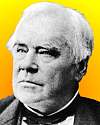 On 18 May 1815, James Bicheno Francis was born, a British-American engineer who originated the scientific method of testing hydraulic machinery. On 18 May 1815, James Bicheno Francis was born, a British-American engineer who originated the scientific method of testing hydraulic machinery.As an engineer, in his time, he made significant contributions to the efficient use and maintenance of waterpower. At Lowell, Massachusetts, the National Park Service maintains an exhibit at Suffolk Mills, the surviving part of an originally huge mill works where the machines were run by the turbines using water power designed and maintained by Francis. Today's feature is an Obituary for James Bicheno Francis which gives you the opportunity to peek at the life of a bygone engineer who still deserves recognition. 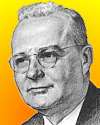 On 18 May 1889, Thomas Midgley, Jr., was born, an American engineer and chemist who worked for Charles F. Kettering at General Motors. Before WW II, Midgley solved the problem of engine knock by a persistent search for a suitable additive to the fuel. Kettering recognized this chemist's achievements in one of his Radio Talks broadcast in the early 1940s as part of the General Motors Symphony of the Air. It was one of the transcripts later published in booklet form, so you can read one of these Short Stories of Science and Invention: Thomas Midgley, Jr. On 18 May 1889, Thomas Midgley, Jr., was born, an American engineer and chemist who worked for Charles F. Kettering at General Motors. Before WW II, Midgley solved the problem of engine knock by a persistent search for a suitable additive to the fuel. Kettering recognized this chemist's achievements in one of his Radio Talks broadcast in the early 1940s as part of the General Motors Symphony of the Air. It was one of the transcripts later published in booklet form, so you can read one of these Short Stories of Science and Invention: Thomas Midgley, Jr. |
| Book of the Day | |
| |
| Quotations for Today | |
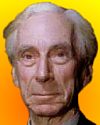 | "A hallucination is a fact, not an error; what is erroneous is a judgment based upon it." |
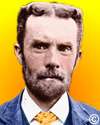 | "Now, in the development of our knowledge of the workings of Nature out of the tremendously complex assemblage of phenomena presented to the scientific inquirer, mathematics plays in some respects a very limited, in others a very important part. As regards the limitations, it is merely necessary to refer to the sciences connected with living matter, and to the ologies generally, to see that the facts and their connections are too indistinctly known to render mathematical analysis practicable, to say nothing of the complexity. Facts are of not much use, considered as facts. They bewilder by their number and their apparent incoherency. Let them be digested into theory, however, and brought into mutual harmony, and it is another matter. Theory is the essence of facts. Without theory scientific knowledge would be only worthy of the madhouse." |
| | "Science would not be what it is if there had not been a Galileo, a Newton or a Lavoisier, any more than music would be what it is if Bach, Beethoven and Wagner had never lived. The world as we know it is the product of its geniuses—and there may be evil as well as beneficent genius—and to deny that fact, is to stultify all history, whether it be that of the intellectual or the economic world." |
| QUIZ | |
| Before you look at today's web page, see if you can answer some of these questions about the events that happened on this day. Some of the names are very familiar. Others will likely stump you. Tickle your curiosity with these questions, then check your answers on today's web page. | |
| Births | |
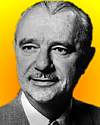 |  Vincent du Vigneaud, born 18 May 1901, was an American biochemist and winner of the Nobel Prize for Chemistry in 1955 for the isolation and synthesis of two hormones, vasopressin and oxytocin. Vasopressin acts on the muscles of the blood vessels to cause elevation of blood pressure. Oxytocin is the principal agent causing contraction of the uterus and the breasts to secrete milk. Vincent du Vigneaud, born 18 May 1901, was an American biochemist and winner of the Nobel Prize for Chemistry in 1955 for the isolation and synthesis of two hormones, vasopressin and oxytocin. Vasopressin acts on the muscles of the blood vessels to cause elevation of blood pressure. Oxytocin is the principal agent causing contraction of the uterus and the breasts to secrete milk. Where in the human body are these hormones produced? Where in the human body are these hormones produced? |
 |  Thomas Midgley, Jr., born 18 May 1889, was an American engineer and chemist who discovered the effectiveness of a certain chemical compound as an antiknock additive for gasoline. Thomas Midgley, Jr., born 18 May 1889, was an American engineer and chemist who discovered the effectiveness of a certain chemical compound as an antiknock additive for gasoline. What was this compound? What was this compound? |
| Deaths | |
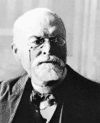 |  Alphonse Laveran (1845-1922) was a French physician, pathologist, and parasitologist. Working in Algeria, he discovered the parasite that causes human malaria in the red blood cells. He founded the medical field of protozoology, doing important work on other protozoal diseases, including sleeping-sickness and kala-azar. For this he received the 1907 Nobel Prize for medicine. From 1896 he spent the rest of his life as a researcher the Pasteur Institute in Paris. Alphonse Laveran (1845-1922) was a French physician, pathologist, and parasitologist. Working in Algeria, he discovered the parasite that causes human malaria in the red blood cells. He founded the medical field of protozoology, doing important work on other protozoal diseases, including sleeping-sickness and kala-azar. For this he received the 1907 Nobel Prize for medicine. From 1896 he spent the rest of his life as a researcher the Pasteur Institute in Paris. What position did he hold in Algeria? What position did he hold in Algeria? |
| Events | |
 On 18 May 1980, following a weeklong series of earthquakes and smaller explosions of ash and smoke, a long-dormant volcano erupted in Washington state, U.S., hurling ash 15,000 feet into the air and setting off mudslides and avalanches. The eruptions caused minimal damage in the sparsely populated area, but about 400 people - mostly loggers and forest rangers - were evacuated. The explosion was characterized as the equivalent of 27,000 atomic bombs. The cloud of ash eventually circled the globe. On 18 May 1980, following a weeklong series of earthquakes and smaller explosions of ash and smoke, a long-dormant volcano erupted in Washington state, U.S., hurling ash 15,000 feet into the air and setting off mudslides and avalanches. The eruptions caused minimal damage in the sparsely populated area, but about 400 people - mostly loggers and forest rangers - were evacuated. The explosion was characterized as the equivalent of 27,000 atomic bombs. The cloud of ash eventually circled the globe. What is the name of this volcano? What is the name of this volcano? | |
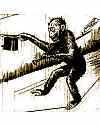 |  On a certain 18 May, the first commercial cargo began its passage through the Panama Canal. On a certain 18 May, the first commercial cargo began its passage through the Panama Canal. In what decade did the cargo move along the Panama Canal? In what decade did the cargo move along the Panama Canal? |
| |  On 18 May 1991, Helen Sharman went where no Briton had gone before. On 18 May 1991, Helen Sharman went where no Briton had gone before. Where did she go? Where did she go? |
| Answers |
When you have your answers ready to all the questions above, you'll find all the information to check them, and more, on the May 18 web page of Today in Science History. Or, try this link first for just the brief answers. Fast answers for the previous newsletter for May 17: Nature; the Latin word vacca, meaning cow, and vaccinia, meaning cowpox; freshwater lakes; agricultural implements; 321.5 million volts, or 3.215 x 108 volts; the decade containing the year 1967; automatic telephone equipment gave the ability to dial other numbers in the town without an operator to get the number for them. |
| Feedback |
 If you enjoy this newsletter, the website, or wish to offer encouragement or ideas, please send feedback by using your mail reader Reply button. If you enjoy this newsletter, the website, or wish to offer encouragement or ideas, please send feedback by using your mail reader Reply button. |
--
If you do not want to receive any more newsletters, this link
To update your preferences and to unsubscribe visit this link
If you do not want to receive any more newsletters, this link
To update your preferences and to unsubscribe visit this link
! !


Δεν υπάρχουν σχόλια:
Δημοσίευση σχολίου